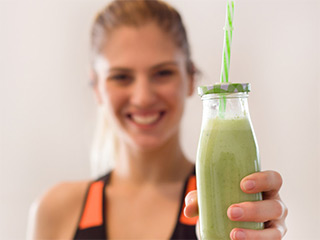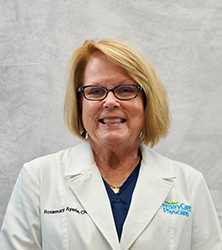The Deal with Detoxing

By: Rosemary Ayerle, CRNP
Detoxing is a popular health fad. Many individuals believe detox diets or liquid cleanses will clear their bodies of harmful toxins, help them lose weight, and even cure diseases. So, what’s the deal with detoxing?
The idea behind detoxing is that toxins (poisons) build up in your body due to poor diets and exposure to environmental factors, causing your body to become overwhelmed and leading to health issues such as headaches, fatigue, stomach trouble, skin rashes and heart disease. It is believed that by following a detox diet or performing a cleanse, accumulated toxins will be flushed out of your body, restoring a healthy balance. However, some detox diets and cleansing advocate use of herbs, supplements, and even colon cleansing with enemas, which can cause potential harmful side effects such as abdominal cramping, dehydration, and electrolyte imbalances.
- Certain liquid diets push out toxins. No detox diet can clean up toxins faster or more effectively than your liver, kidneys and colon. The best “cleansing strategy” for your body is to follow a healthy diet, avoid heavy alcohol intake, and get regular exercise. Smoking cessation is a must.
- Lots of water detoxes your body. Water does provide hydration and helps in ridding the body of toxins when you urinate. However, there’s no benefit to overdoing it. Aim for nine eight-ounce glasses of water per day to stay well-hydrated.
- Saunas sweat out toxins. A small amount of toxins can leave the body when you perspire, but very heavy sweating can impair your natural detox system. You do more detoxing in the bathroom than you ever could in a sauna.
How your body really handles toxins
Toxins are real. Some are natural byproducts of your body’s normal processes. Other toxins we are exposed to, such as pollution, pesticides, and various other environmental chemicals. Tobacco, excessive alcohol, and a diet high in processed foods, saturated fats, and sugar are also toxic to our bodies.
There is little to no evidence that detox diets or cleansers actually remove toxins from the body. Your body is much better at detoxing itself than any juice, special diet, or cleanser. The liver, kidneys, and colon do an excellent job of eliminating and filtering most ingested toxins. Therefore, you don’t need to detoxify because your body is constantly doing it for you when you go to the bathroom.
Support your body’s natural detox ability with healthy eating
It is important to help keep your body’s natural filtering system healthy, so it can continue doing its job of removing toxins. You can achieve this by eating a “clean diet” consisting of fresh fruits and vegetables, whole grains, lean proteins, low-fat dairy, nuts, olive oil, etc. Avoid processed foods that are typically high in saturated fats and high in sugar, as well as excessive alcohol intake.
Detox for weight loss and health issues?
If your goal is weight loss, a detox diet that restricts certain foods might help you drop a few pounds initially. However, since such a restricted diet is not sustainable, you will typically gain any weight lost back and then some. The best approach to weight loss is simply follow a healthy diet, such as the clean diet, and exercise on a regular basis.
As far as disease control, there is no research demonstrating detox diets improve blood pressure, reduce cholesterol, or prevent heart disease. In fact, detox diets may actually be dangerous for health conditions such as diabetes; any diet that severely restricts what you eat could lead to dangerously low blood sugar.
The bottom line on detoxing: Your body can handle toxins just fine. It doesn’t need complicated diets or expensive products to help it do its job.
 Rosemary Ayerle, Certified Registered Nurse Practitioner, received her Bachelor of Science in Nursing degree and her Master of Science in Nursing degree from the University Of Maryland School of Nursing. Ms. Ayerle is board certified by the American Nurses Credentialing Center in Adult Practice, and sees patients in the Bowie office.
Rosemary Ayerle, Certified Registered Nurse Practitioner, received her Bachelor of Science in Nursing degree and her Master of Science in Nursing degree from the University Of Maryland School of Nursing. Ms. Ayerle is board certified by the American Nurses Credentialing Center in Adult Practice, and sees patients in the Bowie office.





